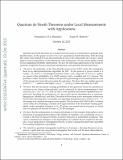Quantum de finetti theorems under local measurements with applications
Author(s)
Brandao, Fernando G.S.L.; Harrow, Aram W.
DownloadHarrow_Quantum de finetti.pdf (433.0Kb)
OPEN_ACCESS_POLICY
Open Access Policy
Creative Commons Attribution-Noncommercial-Share Alike
Terms of use
Metadata
Show full item recordAbstract
Quantum de Finetti theorems are a useful tool in the study of correlations in quantum multipartite states. In this paper we prove two new quantum de Finetti theorems, both showing that under tests formed by local measurements in each of the subsystems one can get a much improved error dependence on the dimension of the subsystems. We also obtain similar results for non-signaling probability distributions. We give the following applications of the results to quantum complexity theory, polynomial optimization, and quantum information theory: We prove the optimality of the Chen-Drucker protocol for 3-SAT, under the assumption there is no subexponential-time algorithm for SAT. In the protocol a prover sends to a verifier √n polylog(n) unentangled quantum states, each composed of O(log(n)) qubits, as a proof of the satisfiability of a 3-SAT instance with n variables and O(n) clauses. The quantum verifier checks the validity of the proof by performing local measurements on each of the proofs and classically processing the outcomes. We show that any similar protocol with O(n1/2 - ε) qubits would imply a exp (n1 - 2ε polylog(n))-time algorithm for 3-SAT. We show that the maximum winning probability of free games (in which the questions to each prover are chosen independently) can be estimated by linear programming in time exp(O(log|Q| + log2|A|/ε2) ), with |Q| and |A| the question and answer alphabet sizes, respectively, matching the performance of a previously known algorithm due to Aaronson, Impagliazzo, Moshkovitz, and Shor. This result follows from a new monogamy relation for non-locality, showing that k-extendible non-signaling distributions give at most a O(k-1/2) advantage over classical strategies for free games. We also show that 3-SAT with n variables can be reduced to obtaining a constant error approximation of the maximum winning probability under entangled strategies of O(√n)-player one-round non-local games, in which only two players are selected to send O(√n)-bit messages. We show that the optimization of certain polynomials over the complex hypersphere can be performed in quasipolynomial time in the number of variables $n$ by considering O(log(n)) rounds of the Sum-of-Squares (Parrilo/Lasserre) hierarchy of semidefinite programs. This can be considered an analogue to the hypersphere of a similar known results for the simplex. As an application to entanglement theory, we find a quasipolynomial-time algorithm for deciding multipartite separability. We consider a quantum tomography result due to Aaronson -- showing that given an unknown n-qubit state one can perform tomography that works well for most observables by measuring only O(n) independent and identically distributed (i.i.d.) copies of the state -- and relax the assumption of having i.i.d copies of the state to merely the ability to select subsystems at random from a quantum multipartite state. The proofs of the new quantum de Finetti theorems are based on information theory, in particular on the chain rule of mutual information. The results constitute improvements and generalizations of a recent de Finetti theorem due to Brandao, Christandl and Yard.
Date issued
2013-06Department
Massachusetts Institute of Technology. Department of PhysicsJournal
Proceedings of the 45th annual ACM Symposium on Theory of Computing - STOC '13
Publisher
Association for Computing Machinery
Citation
Brandao, Fernando G.S.L., and Aram W. Harrow. “Quantum de Finetti Theorems Under Local Measurements with Applications.” Proceedings of the 45th Annual ACM Symposium on Symposium on Theory of Computing - STOC ’13 (2013), June 1-4, 2013, Palo Alto, California, USA.
Version: Original manuscript
ISBN
9781450320290